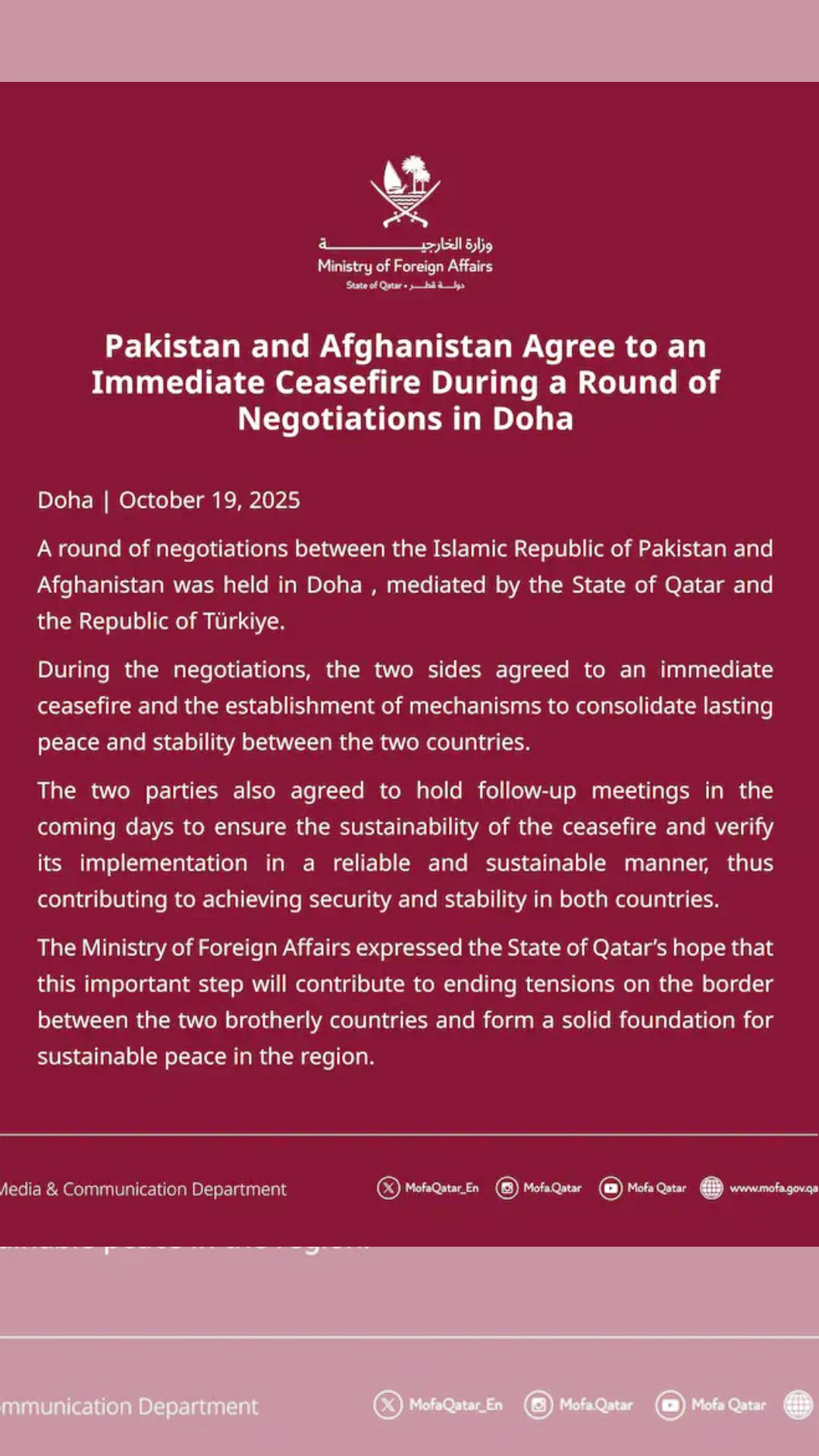In a significant breakthrough aimed at halting escalating border violence, Pakistan and Afghanistan have reached an agreement for an immediate ceasefire during peace negotiations hosted in Qatar’s capital, Doha.
The Qatari foreign ministry made the announcement in the early hours of Sunday, marking a pivotal moment in efforts to de-escalate a week-long conflict that has claimed dozens of lives and injured hundreds more.
The talks, which were jointly mediated by Qatar and Turkey, are specifically designed to bring an end to the intense clashes along the shared border that have strained relations between the two neighbouring countries. According to an official statement from Qatar’s foreign ministry, both Pakistan and Afghanistan have committed to convening follow-up meetings in the coming days. These sessions are intended “to ensure the sustainability of the ceasefire and verify its implementation in a reliable and sustainable manner.”

The negotiations in Doha arrive at a critical juncture, following a week of fierce border fighting that has resulted in the deaths of dozens of people and injuries to hundreds. This confrontation represents the most severe episode of violence between Pakistan and Afghanistan since the Taliban regained control of Kabul in August 2021.
Afghan officials confirmed the participation of a high-level delegation from Kabul, led by Defence Minister Mullah Muhammad Yaqoob, in the Doha discussions. On the Pakistani side, Defence Minister Khawaja Muhammad Asif headed the talks, engaging directly with representatives from the Taliban administration.
Pakistan’s foreign office provided further details on the agenda, stating that the discussions centred on "immediate measures to end cross-border terrorism against Pakistan emanating from Afghanistan and restore peace and stability along the Pak-Afghan border."
The recent surge in violence was triggered by Islamabad’s repeated demands for Kabul to take decisive action against militants operating from safe havens across the Afghan border. Over the past several months, these groups have intensified their attacks inside Pakistan, prompting urgent calls for intervention.
The Taliban government in Afghanistan has categorically denied providing shelter to any militants. In response, Kabul has accused Pakistan of disseminating misinformation and actively supporting Islamic State-linked groups with the deliberate aim of destabilising the country. Pakistani officials have firmly rejected these allegations, asserting that the militants in question have been conducting a prolonged campaign aimed at overthrowing the Pakistani government and imposing a strict form of Islamic rule.
The border tensions reached a deadly peak on Friday when a suicide attack near the frontier killed seven Pakistani soldiers and wounded 13 others. In a strongly worded statement, Pakistan’s army chief, Field Marshal Asim Munir, emphasised the urgency of the situation, declaring that “the Afghan regime must control proxy groups using Afghan soil to carry out attacks inside Pakistan.”
Even as the ceasefire was announced, fresh accusations emerged that threatened to undermine the fragile truce. Afghanistan claimed that Pakistan carried out airstrikes targeting civilians just hours after extending the ceasefire on Friday. In a show of restraint to preserve the ongoing negotiating process, Kabul stated that its fighters had been explicitly ordered not to retaliate.
Also Read: Pakistan: 100 terrorists killed in anti-terror ops in 48 hours
In a related development, Afghanistan announced its immediate withdrawal from a planned tri-nation T20 cricket series involving Pakistan and Sri Lanka. The decision came after three Afghan domestic cricketers were killed in the alleged strikes in Paktika province. The tri-series was scheduled to take place in Lahore and Rawalpindi from November 5 to 29, with Afghanistan set to participate alongside the hosts and Sri Lanka.
Pakistan’s Information Minister Attaullah Tarar countered the claims, insisting that the airstrikes had precisely targeted “verified” militant camps and resulted in the deaths of over 100 militants. He categorically rejected all assertions of civilian casualties.
The ceasefire, facilitated through mediation in Doha, represents a crucial step forward in easing longstanding tensions and paving the way for long-term stability along the 2,600-km Pakistan-Afghanistan border. As follow-up meetings are planned in the immediate days ahead, both nations now face the challenge of translating this agreement into verifiable actions that can prevent future outbreaks of violence and foster enduring peace in the region.
Also Read: Afghan Cricket players among 8 dead in Pak air strike



